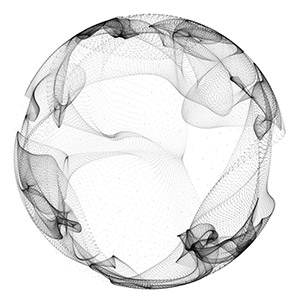Third article as a response to Unknown Cloud in Tagesspiegel
Helena Granström (b. 1983) is a Swedish writer, with a background in physics and mathematics. She is the author of six books, both in fiction and non-fiction, on subjects ranging from childhood and pregnancy, to technology and the history of quantum mechanics. Her latest book, published in 2016, is an essay on the cultural mythology of industrial civilization.

In Search for the Other_
To meet another living creature entails a necessary loss of control. Faced with the other,
I can direct my gaze towards him or her, but I can never know how it will be answered.
I can speak, address, but the answer I receive will always be beyond what I am able to
influence, as well as my own bodys response to everything that is going on:
My blood vessels, my lungs and my heart participate in the conversation as much as those
parts of me that speak, but what I call I has no influence over this.
I look into the face of the other and realize: You are like me, but you are not me. You think,
feel and experience like me, but something different than I do.
It is this realization that forms the basis of all true reciprocity: The realization of the
simultaneous similarity of the other, and its radical otherness.
The truly undermining aspect of the other's gaze - what is equally horrific and comforting
- is that it is both a gaze and not one's own.
And maybe it is this very basis for reciprocity that we now, in the name of technological
development, are about to abandon - to actively discard.
In the age of digitality, the boundary between myself and other is being muddled: When I
believe myself meeting the other through a machine, I simultaneously meet the machine, I
simultaneously meet myself in front of the machine - this machine, which in a sense is also my own creation.
But despite this, I say that I meet the other, just as we say that whoever speaks with an
artificial intelligence is not alone, that the person who is updating his profile on social media
is amongst friends, that the one who is held by a robot is in real terms being held.
We construct our cities as if to convince ourselves that human purposes are the only
purposes that exist,
- that human creates and controls reality, that through science, engineering, technology, we
have made ourselves independent of the world which we once considered ourselves as
being a part of.
As if to be sure, we eliminate the uncontrollable that would have reminded us of the
opposite.
And, as if to cover this loss, we change the basic categories we use to interpret the world.
A farm with absolute monotony as a platonic ideal, a forestry which, while it seems to
eliminate the meaning of the term forest; in order to not only to sustain but also increase
what we call prosperity and quality of life in these practices, the significance of the forest
must be altered, as well as the meaning of a living earth.
Call tree plantations forests, and you will not have to see your own culture level the last
forest to the ground; call nature the environment, so that you can forget that it has ever
been anything but a buffer for the destructive effects of human progress.
And, correspondingly, we must learn to understand digital presence as presence, learn to
understand the absence it causes as a presence in another, more real, context - learn to
understand the loneliness we are never allowed to fully perceive as meaningless, and the
community we tentatively can perceive as merely a more primitive form of the bodiless
community of the digital sphere.
Only if we refuse to do this will we be able to seriously confront the most obvious fact of
digitalized life: A prerequisite for being present everywhere is to never be present where
you really are.
To the same extent as we have turned our face towards our own creations, we have turned
it away from the face of the truly living world.
That there is a face means that there exists a you: There is no face, is what we say. All nonhuman
animals, as well as of course all plants, lack consciousness, advanced intelligence
and the ability to accommodate complex feelings
- but by ourselves, we are capable of constructing our own sensing robots, smart phones,
conscious machines; the subjectivity of which we rather acknowledge, since it is a
subjectivity entirely under our control.
The face of the other can currently only be considered as a double exposure, always partly
hidden behind our own mirror image.
When everything in my world is created by me, created for me, created to simulate the
experience of something I will, as a consequence, never experience in reality - where is that
you that allows me to tentatively grasp what this I is?
Back to articles